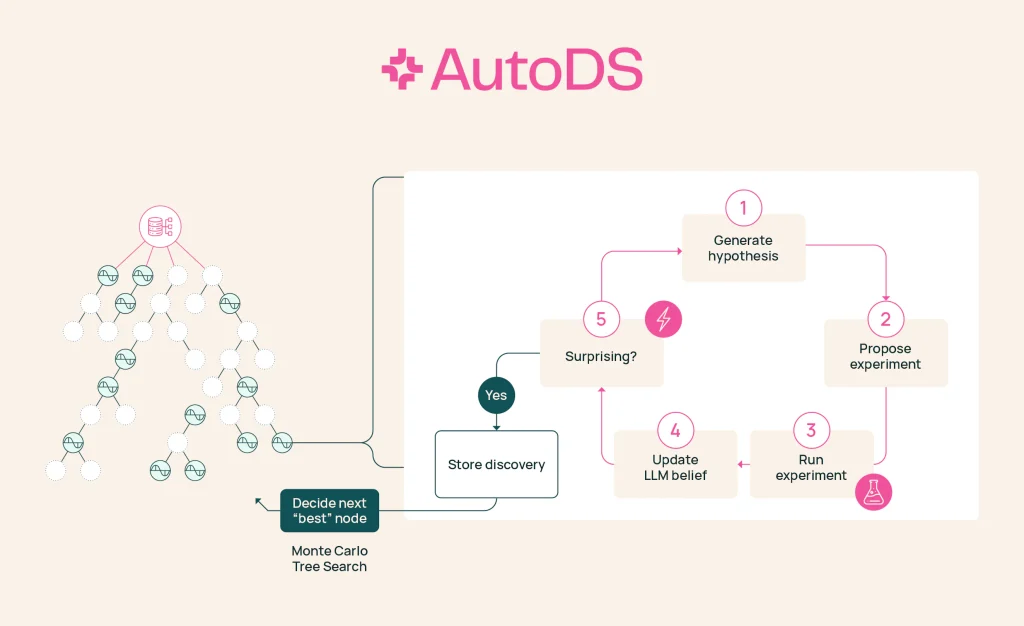Allen Institute for AI-Ai2 Unveils AutoDS: A Bayesian Surprise-Driven Engine for Open-Ended Scientific Discovery
The Allen Institute for Artificial Intelligence (AI2) has introduced AutoDS (Autonomous Discovery via Surprisal), a prototype engine for open-ended autonomous scientific discovery. Unlike traditional AI research assistants that rely on human-defined objectives, AutoDS autonomously generates, tests, and iterates on hypotheses by quantifying and seeking out “Bayesian surprise”—a measure of genuine discovery beyond predefined human queries.
From Goal-Driven Inquiry to Open-Ended Exploration
Conventional approaches to autonomous scientific discovery (ASD) often focus on answering specific research questions: generating hypotheses relevant to a problem and experimentally validating them. AutoDS moves beyond this paradigm by operating in an open-ended manner. It autonomously determines what questions to ask, which hypotheses to pursue, and how to build upon previous findings, all without predefined objectives.
Open-ended discovery poses challenges, including traversing comprehensive hypothesis spaces and prioritizing hypotheses worth investigating. AutoDS formalizes the concept of “surprisal”—a measurable shift in belief about a hypothesis before and after acquiring empirical evidence.
Quantifying Bayesian Surprise via Large Language Models
At the core of AutoDS lies a new framework for estimating Bayesian surprise. For each hypothesis generated, state-of-the-art large language models (LLMs), such as GPT-4o, function as probabilistic observers, expressing their “belief” about the hypothesis through probability distributions before and after empirical testing. These belief distributions are constructed using Beta distributions.
To identify meaningful discoveries, AutoDS calculates the Kullback-Leibler (KL) divergence between the posterior (after evidence) and prior (before evidence) Beta distributions. Only belief shifts crossing a threshold of evidential change—such as moving from likely true to likely false—are treated as significant, ensuring the system focuses on substantial discoveries rather than trivial updates.
Efficient Hypothesis Search with MCTS
AutoDS employs Monte Carlo Tree Search (MCTS) with progressive widening to efficiently explore the vast landscape of hypotheses. Each node in the search tree represents a hypothesis, while branches correspond to new hypotheses based on prior findings. This approach balances the exploration of novel avenues with the pursuit of promising leads.
Unlike greedy or beam search methods that may prematurely prune or overcommit, MCTS maintains high discovery efficiency under fixed computational resources. Across 21 datasets from biology, economics, and behavioral science, AutoDS outperformed repeated sampling, greedy, and beam search methods, discovering 5–29% more hypotheses deemed surprising by the LLM.
A Modular Multi-Agent LLM Architecture
AutoDS coordinates a series of specialized LLM agents, each responsible for different aspects of the scientific workflow:
- Hypothesis Generation
- Experimental Design
- Programming and Execution
- Results Analysis and Revision
To ensure the final output comprises truly distinct discoveries, semantically similar hypotheses are deduplicated using a hierarchical clustering pipeline that combines LLM-based text embeddings with pairwise semantic equivalence checks.
Human Alignment and Interpretability
Alignment with human scientific intuition is essential. In a structured evaluation involving reviewers with MS/PhD-level STEM backgrounds, 67% of the hypotheses deemed surprising by AutoDS were also considered surprising by human domain experts. Furthermore, the Bayesian surprise metric aligned more closely with human judgment compared to other metrics, such as predicted “interestingness” or “utility.”
Interestingly, the nature of surprising belief shifts varied by scientific field, indicating that confirmatory claims often require stronger evidence to be seen as surprising compared to novel falsifications.
Practical Considerations and Future Outlook
With over 98% of evaluated discoveries considered correctly implemented by human reviewers, AutoDS demonstrates both high implementation and experimental validity. While the current system relies on API-driven LLMs, facing latency constraints, a “programmatic search” implementation has been explored for faster results, albeit with less conceptual richness.
Though AutoDS remains a research prototype with plans for open-sourcing, its architecture and empirical success offer a promising direction for scalable, AI-driven scientific inquiry.
Conclusion
AutoDS signifies a notable advancement in autonomous scientific reasoning. By shifting from goal-driven research to curiosity-based exploration and grounding its search in Bayesian surprise, it opens pathways toward future AI systems capable of enhancing, accelerating, or even independently driving scientific discovery.
Check out the Paper, GitHub Page, and Blog. All credit for this research goes to the researchers of this project.
Sponsorship Opportunity: Reach the most influential AI developers in the US and Europe with over 1 million monthly readers, 500,000 community builders, and infinite possibilities. Explore Sponsorship
